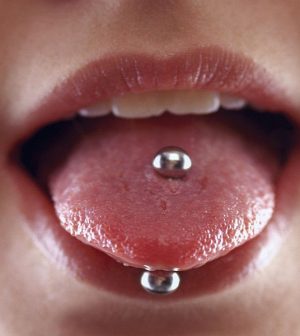- Could Artificial Sweeteners Be Aging the Brain Faster?
- Techniques for Soothing Your Nervous System
- Does the Water in Your House Smell Funny? Here’s Why
- Can a Daily Dose of Apple Cider Vinegar Actually Aid Weight Loss?
- 6 Health Beverages That Can Actually Spike Your Blood Sugar
- Treatment Options for Social Anxiety Disorder
- Understanding the Connection Between Anxiety and Depression
- How Daily Prunes Can Influence Cholesterol and Inflammation
- When to Take B12 for Better Absorption and Energy
- Epsom Salts: Health Benefits and Uses
Tongue, Lip Piercings May Harm Teeth and Gums

Getting your tongue or lips pierced? Don’t be surprised when your dentist is unhappy about it.
These piercings can do damage to your teeth and gums, a new study warns.
“Our study found that many people with oral piercings had deep pockets and gaps around their teeth, and receding and bleeding gums,” said study author Dr. Clemens Walter, a professor at University Medicine Greifswald in Germany. “These are all signs of periodontitis, also called gum disease, which can lead to tooth loss.”
Walter and his colleagues analyzed eight studies that included 408 people with a combined 236 lip piercings and 236 tongue piercings. In all, 1 in 5 had more than one oral piercing. The participants reported having their piercings ranging from one month to 19 years, and most folks wore metal jewelry in their piercings.
The studies compared teeth and gums next to the piercings with areas elsewhere in the mouth.
Researchers reported that 3 in 5 studies found deeper pockets around teeth next to tongue piercings, and 3 in 4 found wider gaps between teeth; 2 in 3 found bleeding gums, and four studies looking for receding gums found it in all four.
In addition, 3 of 4 studies looking at lip piercings revealed receding gums in the area.
The study review was presented Wednesday at a meeting of the European Federation of Periodontology, in Copenhagen. Research presented at meetings is typically considered preliminary until published in a peer-reviewed journal.
“The findings suggest that oral piercings, especially in the tongue, negatively affect the adjacent teeth and gums,” Walter said in a meeting news release. “In those with tongue piercings, damage was particularly notable around the bottom two front teeth, called the mandibular incisors, which are important for biting and chewing food.”
The likelihood of tooth and gum damage appeared to increase with time, he added.
His advice: “People with tongue and lip piercings should remove them to protect their teeth and gums from further damage,” Walter said.
About 5% of young adults have oral piercings, with the tongue being the most common site. Women are about four times more likely to have an oral piercing than men, according to the study authors.
Previous research has yielded similar findings. Researchers on the new study urged dentists to tell their patients about the risk of complications from wearing oral piercings.
More information
There’s more on oral piercing at the American Dental Association.
SOURCE: European Federation of Periodontology, news release, June 16, 2022
Source: HealthDay
Copyright © 2026 HealthDay. All rights reserved.










